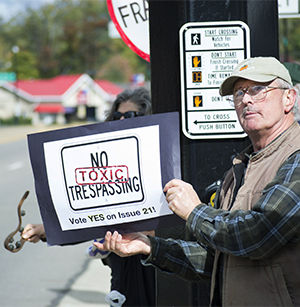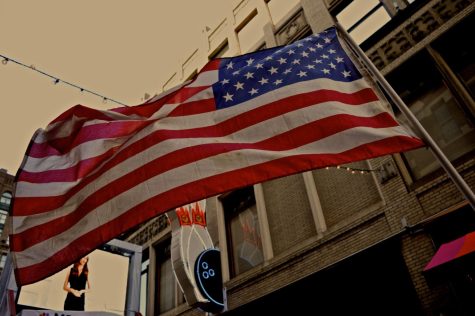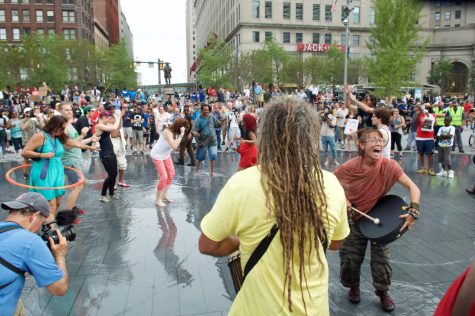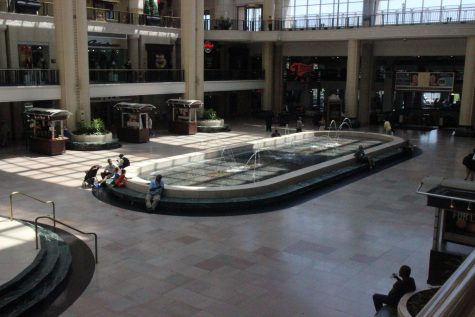Local fracking ban, bill of rights opposition forms in Kent

David Stover, a resident of Tallmadge, holds his Issue 21 sign out to the passing traffic on E. Main with other demonstrators from the Global Frackdown rally Saturday, Oct. 11, 2014. Issue 2, on the Nov. 4 ballot, could create a community bill of rights for the city of Kent that would allow the community to have more of a say in the creation and location of fracking and drilling.
October 29, 2014
Issue 21 on the Nov. 4 ballot is an amendment to the city charter, which, if passed, would guarantee Kent residents legal rights to clean air, pure water, local community self-government, freedom from toxic trespass and protection of natural communities.
The amendment, known as the “Community Bill of Rights” would also prevent and ban fracking within Kent’s city limits.
The Kent Environmental Rights Group, a grassroots organization that supports the bill of rights, claims Issue 21 would protect Kent residents from potentially harmful effects of fracking. KERG’s core group of members are all residents of the city, but outside legal and environmental groups support it as well.
In October, several city council members joined forces, acting as private citizens rather than council members, to form Citizens for Good Legislation in opposition to Issue 21.
“Aimed at educating citizens” about the “poorly written and overly broad” proposed law, CGL is the brainchild of James Silver, law director for the City of Kent.
“As an individual, this is not from my position as law director: I think this law is stupid, to put it bluntly,” Silver said. “It’s ill-written, it’s ill-conceived, and it’s going to have consequences that I don’t think people have thought through. So, I felt strongly enough that I decided to act on it, put my money where my mouth is.”
A coalition group that includes Silver, Kent Mayor Jerry Fiala, Service Director Gene Roberts, five councilmen, as well as local business leaders like John Ryan, CGL is registered with the Portage County Board of Elections as an official political action committee. Silver, the group’s treasurer, said the group has been receiving donations, including “a decent contribution from the Ohio Chamber of Commerce.”
Kent precinct sample ballots describe Issue 21 as a “Proposed Charter Amendment” for the City of Kent along with “A majority affirmative vote is necessary for passage. Shall the proposed amendment to the Charter of the City of Kent adding Section 4 et seq. to Article I.” and “Incorporation; Form of Government; Powers, under heading titled Community Bill of Rights to be adopted?”
There are only two options: “Yes” and “No.”
Fiala said after the city council meeting on Oct. 15 that he had already voted “no” absentee. As mayor and council president, he said he was informed on the details of the proposed amendment.
But, with the limited information listed on the ballot, he said he is concerned voters might blindly vote without understanding the nature of the issue.
“It isn’t so much the fracking idea as it’s a Trojan Horse,” Fiala said. “It’s all the side parts that are our concern. And it doesn’t matter about fracking — the state’s going to regulate us anyhow. It’s kind of a moot point… The issue is not very well written, it’s very not well thought out.”
Both groups have been active in the community, passing out yard signs, distributing flyers, making calls to residents, or going door-to-door to talk about Issue 21. KERG, with its push to get signatures for the ballot initiative during the summer, had a head start of sorts in educating the public about fracking and the dangers they see it poses to the city.
“We were favorably received,” said Perry Phillips, a founding member of KERG. “People saw we wanted to ban fracking, and they agree. We didn’t have much opposition at the door.”
Silver said that the main goal of CGL is to re-educate Kent residents, not about the possible dangers of fracking, but about the actual legal document that is being voted on. Whether it’s yard signs with “Vote No on Issue 21” or radio spots discussing the bill of rights movement, Silver said that CGL is hoping that awareness will push voters to vote “no.”
“I don’t know how many people we’ve gone to that have signed the petition, ‘Did you read it?’ ‘Well no, they said it was against fracking.’ ‘Ok, here it is.’ ‘Well that’s not what I wanted. I’m not for that,’” Silver said. “So, you know, they were not told what was in it, they didn’t even bother to read it. They signed the petitions to get it on the ballot.”
Despite what either side of the community discussion claims, the proposed amendment, as written, lists consequences for violating the bill of rights if it’s enacted into law. That includes lawsuits from residents if they feel their rights are being violated.
As law director, Silver said if Issue 21 passes on Nov. 4, he doesn’t expect lawsuits to begin coming in on Nov. 5.
”(They will) at some point (though), because I’m sure KERG will ask us to shut down the wells that are now running in Kent,” he said.
Using an existing well on the United Methodist Church’s property as an example, Silver said that if a Kent resident asked, he would have to send the property owner a letter ordering them to shut the well down because it violates the resident’s rights.
Most likely, he said, that would spark a lawsuit from the oil company that operates the well.
“If you’re extracting hydrocarbons from the earth, stop,” Silver said, referencing a controversial phrase in the amendment.
Existing state laws regulating the oil and gas industry already exist, but if passed, the community bill of rights charter amendment would preempt those state-level laws. Phillips said that for KERG, this is how democracy at a base level should work.
“What happens when this law passes is this: If any company wants to drill within the city limits, they will have to take action against the city because a majority of the citizens don’t want fracking,” Phillips said. “Come and get us. Come and get us, I say. If they think they can come lay pipelines and drill, they’re going to have to come through us.”
Contact Matthew Merchant at [email protected].



















